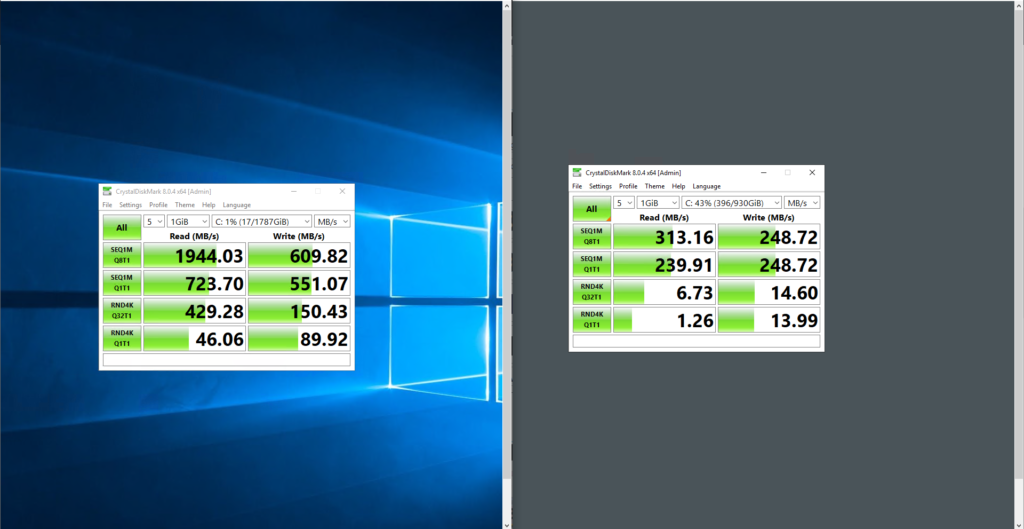SSD vs SAS drives in website hosting: SSD’s explained
Posted on 13 July 2022
Recently we deviced to test the speed of a couple 7.2k SAS drives against 2 Enterprise Sata SSD drives. The results are here:

Both of these servers were identical at the time of testing, same make and model, same CPU’s, same RAM, same motherboards. The only difference really was the type of drives. SSD on the left and SAS on the right.
It would be interesting to place faster 10K and 15K drives in the middle but we didn’t have these available at the time, although we know they’re not as fast as solid state storage anyway.
Why might you want SSD storage for your website?
SSD’s are much faster than traditional HDD’s. This means when your website is requested, it theoretically should be delivered much faster (although other components come into play too). Generally though you should expect better performance from SSD’s.
With the decling cost of SSD’s they’re not much more expensive to host on and this appears to be becoming something of an industry standard, 20i, GoDaddy, OVH, P1 Hosting and ourselves are all using SSD’s as well as many others.
Do HDD’s still have a use?
Yes. HDD’s are cheap per GB compared to SSD’s, they make great backup drives and excellent drives for archiving and storing a lot of information.
But that’s not all. With shared hosting using SSD’s you might actually find a dedicated server with mechanical HDD’s is faster. This is case by case but it could mean if you’re running a website or web application that takes up a lot of storage, HDD’s might be the better option.
SATA vs SAS
SSD’s come in 3 main flavours, SATA, SAS and NVME, HDD’s typically come in Sata or SAS for enterprise applications.
NVMe is generally faster than SAS and SAS is generally faster than SATA. However in our test the slower SATA connection that the SSD’s used was much faster than the SAS HDD’s. If this had been a HDD SATA vs SAS test or SSD SATA vs SAS test, SAS should outperform SATA.
SAS is typically faster because of several factors, one example of this is with a dual port SAS connection you get 6Gbps x 2 rather than 6Gbps. SAS typically is geared more towards performance over storage and sata is geared more toward storage over performance. In the case of mechanical drives SAS drives usually come in the following speeds, 7200, 10,000 and 15,000RPM, Sata drives tend to be 5400RPM, 7200 and 10,000RPM.
Of course with mechanical and solid drives, there is overlaps. An older generation SAS drive could be slower than a newer generation SATA one.
NVMe
NVMe is a newer technology than SAS and SATA and usually uses PCIE. NVMe is much faster than SAS again but the price per GB tends to be higher. This is especially true for enterprise drives.
We’ve seen GoDaddy advertising NVMe hosting as well as others. One thing we’d like to touch on though – 10,000 websites operating on NVMe vs 100 on SATA SSD’s… if the traffic is there, you’ll likely see SATA outperform.
As appealing as NVMe drives are, it’s wise to check the host offering them isn’t overselling.
This would mean too things, they’re able to offer NVMe hosting cheap, the performance is going to be awful.
The same can be said for SATA/SAS SSD hosts vs SAS HDD hosts.
Not every NVMe host will offer faster storage due to overselling and other factors, all you can do is do your own research and testing.
